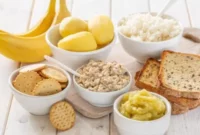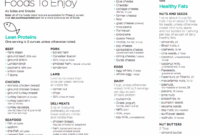South Beach Diet drinks play a crucial role in the success of this popular weight-loss plan. Understanding which beverages are permitted and which are prohibited is key to achieving your health goals. This guide delves into the principles behind South Beach Diet beverage choices, exploring nutritional content, providing delicious recipes, and examining both the benefits and potential risks associated with specific drinks. We’ll also cover how these choices impact weight management and overall health.
From refreshing teas to flavorful infused waters, the South Beach Diet offers a variety of hydrating and satisfying beverage options that support its low-carbohydrate, healthy-fat approach. We will explore the science behind these choices, clarifying the impact on blood sugar levels and overall nutritional intake. We’ll also dispel common myths and answer frequently asked questions to provide a complete understanding of this important aspect of the diet.
Nutritional Content of South Beach Diet Drinks
The South Beach Diet emphasizes low-glycemic-index foods to promote healthy blood sugar levels and weight management. Their beverage line reflects this philosophy, offering options designed to complement the dietary plan. Understanding the nutritional composition of these drinks is crucial for anyone following the diet to ensure they align with their overall health goals.
Macronutrient Composition of South Beach Diet Beverages
South Beach Diet drinks typically feature a balance of carbohydrates, protein, and fat, though the ratios vary depending on the specific beverage. For instance, some protein shakes might be higher in protein and lower in carbohydrates, while other drinks, such as certain flavored waters, might contain minimal amounts of all three macronutrients. It’s important to check the nutritional labels of individual products for precise macronutrient breakdowns. Generally, the goal is to minimize added sugars and prioritize complex carbohydrates when present. For example, a protein shake might contain approximately 20g of protein, 10g of carbohydrates, and 5g of fat per serving, while a sugar-free iced tea might have negligible amounts of all three.
Comparison of Nutritional Value Across Different South Beach Diet Drinks
The nutritional value of South Beach Diet drinks varies significantly based on their ingredients and intended purpose. Protein shakes, designed to support muscle growth and satiety, generally provide a higher protein content compared to sugar-free teas or flavored waters. These teas and waters, in contrast, often focus on hydration and minimal caloric intake. Some drinks may also incorporate vitamins and minerals, further enhancing their nutritional profile. For example, a vitamin-enhanced water might contain added electrolytes and vitamins C and B. The variety of options allows individuals to tailor their beverage choices to their specific dietary needs and preferences.
Vitamins and Minerals in South Beach Diet Beverages
While not all South Beach Diet drinks contain added vitamins and minerals, some formulations incorporate these nutrients to enhance their nutritional value. For example, certain protein shakes might include added vitamins such as Vitamin D, Vitamin B12, and essential minerals like calcium and potassium. These additions aim to provide additional nutritional support, supplementing the overall dietary intake. However, it’s important to remember that these beverages should not be considered a primary source of vitamins and minerals; a balanced diet remains essential.
Glycemic Index of South Beach Diet Drinks and Their Impact on Blood Sugar
The glycemic index (GI) of South Beach Diet drinks is generally low, reflecting the diet’s focus on blood sugar control. Drinks with low GI values, such as sugar-free teas and unsweetened waters, have minimal impact on blood glucose levels. However, drinks containing added sugars or carbohydrates with higher GI values can potentially lead to fluctuations in blood sugar. Therefore, individuals following the South Beach Diet should carefully review the nutritional information of each beverage to select those that align with their blood sugar management goals. Choosing drinks with low or no added sugar is crucial for maintaining stable blood sugar levels and avoiding spikes.
Recipes for South Beach Diet Drinks
The South Beach Diet emphasizes low-glycemic foods to promote healthy weight loss and blood sugar control. These recipes offer refreshing and delicious beverage options that align perfectly with the diet’s principles, providing hydration and flavor without compromising your dietary goals. Remember to always adjust sweetness to your personal preference.
South Beach Diet-Friendly Beverage Recipes
The following recipes offer a variety of flavors and textures, all while adhering to the principles of the South Beach Diet. Each recipe is designed to be easily prepared and provides a satisfying and healthy alternative to sugary drinks.
| Name | Ingredients | Instructions | Serving Size |
|---|---|---|---|
| Refreshing Cucumber Mint Infused Water |
|
|
1 serving (approximately 1 cup) |
| Sparkling Raspberry Lime Refresher |
|
|
1 serving |
| Strawberry Basil Iced Tea |
|
|
1 serving (approximately 1 cup) |
Impact on Weight Management
The South Beach Diet, with its emphasis on low-glycemic index foods and controlled carbohydrate intake, often incorporates specific beverage choices to support its weight management goals. Successfully managing weight involves a multifaceted approach, and the role of beverages, both in terms of calorie content and overall dietary impact, is significant. Understanding how beverage choices can either aid or hinder weight loss efforts is crucial for achieving sustainable results.
The choice of beverages significantly influences overall calorie intake, often contributing more calories than many realize. Sugary drinks, such as sodas and sweetened juices, are calorie-dense and offer minimal nutritional value. Replacing these with lower-calorie alternatives can lead to a substantial reduction in daily caloric intake, fostering weight loss or maintenance. Conversely, consistently consuming high-calorie beverages can counteract the efforts made through dietary restrictions, hindering progress.
Calorie Control through Beverage Selection
The South Beach Diet encourages the selection of beverages that are low in calories and sugar. This strategy contributes to an overall reduction in daily caloric intake, which is fundamental for weight management. For example, substituting a sugary soda (approximately 150-200 calories) with unsweetened tea or water (0 calories) can result in a significant daily calorie deficit over time. This consistent reduction can lead to noticeable weight loss. Furthermore, choosing beverages rich in nutrients, such as those containing antioxidants or electrolytes, can support overall health and well-being, promoting a more sustainable approach to weight management.
Hydration and Appetite Regulation
Adequate hydration plays a vital role in weight management. Water, often overlooked, aids in satiety, reducing overall food consumption. Drinking water before meals can help individuals feel fuller, leading to smaller portion sizes and ultimately, lower calorie intake. The South Beach Diet emphasizes water consumption throughout the day, promoting satiety and supporting the body’s metabolic processes, contributing to more efficient weight management. Conversely, inadequate hydration can lead to increased hunger and potentially increased caloric intake.
Examples of South Beach Diet-Friendly Drinks
Unsweetened iced tea, infused water with fruits like lemon or cucumber, and black coffee are all examples of low-calorie, South Beach Diet-friendly beverages. These options provide hydration without adding significant calories or sugar. Furthermore, the inclusion of natural flavors like lemon or cucumber in water can add a refreshing twist, promoting consistent hydration throughout the day. These choices support the diet’s focus on whole, unprocessed foods and a balanced approach to nutrition.
Potential Health Benefits and Risks
The South Beach Diet, while focusing on balanced macronutrient intake, emphasizes specific beverage choices to support its weight-loss and health goals. Understanding the potential benefits and drawbacks of these choices is crucial for maximizing the diet’s effectiveness and minimizing any potential negative impacts. This section will explore the advantages and disadvantages associated with South Beach Diet-approved drinks, and compare their long-term effects with other dietary approaches.
South Beach Diet drinks, generally emphasizing water, unsweetened tea, and certain juices in moderation, can offer several health advantages. These benefits stem primarily from their low sugar content and inclusion of hydrating fluids. Conversely, relying heavily on specific South Beach Diet beverages without considering overall dietary balance might lead to nutritional deficiencies or other health concerns.
Health Benefits of South Beach Diet Beverages
The primary benefit of South Beach Diet-approved beverages lies in their contribution to overall hydration and the avoidance of excessive sugar intake. Adequate hydration is crucial for numerous bodily functions, including metabolism, nutrient absorption, and temperature regulation. Limiting sugary drinks helps prevent weight gain, reduces the risk of type 2 diabetes, and can improve cardiovascular health. For example, replacing sugary sodas with water or unsweetened tea can significantly reduce daily caloric intake and improve metabolic markers. Furthermore, some South Beach-approved beverages, such as green tea, offer additional health benefits due to their antioxidant properties. These antioxidants can help protect cells from damage caused by free radicals, potentially reducing the risk of chronic diseases.
Potential Risks of South Beach Diet Beverages
While generally healthy, over-reliance on certain South Beach Diet beverages can present potential risks. For instance, excessive consumption of even unsweetened juices can contribute to high fructose intake, potentially affecting liver health and contributing to weight gain over time. Furthermore, some individuals might experience digestive discomfort from certain fruits or fruit juices included in the plan. Also, neglecting other important beverages like milk, which offers essential calcium and vitamin D, could lead to nutritional deficiencies if not carefully managed within the overall diet. A restrictive approach to beverages, without proper planning, might also lead to dehydration if water intake is insufficient.
Long-Term Effects Compared to Other Diets
The long-term effects of adhering to a South Beach Diet beverage plan, when coupled with a balanced diet, are generally positive, supporting healthy weight management and reducing the risk of chronic diseases. However, this positive impact hinges on the overall adherence to the diet’s principles, not solely the beverage component. Compared to diets that liberally allow sugary drinks, the South Beach Diet’s approach shows a clear advantage in long-term weight management and metabolic health. Studies have shown that diets low in sugar and high in water consumption are more sustainable and effective for long-term weight loss compared to those which do not control sugar intake. For example, a study published in the American Journal of Clinical Nutrition demonstrated that individuals following a low-sugar diet maintained weight loss more effectively over a five-year period compared to those following a control diet with higher sugar intake. However, it’s important to remember that no single dietary approach is universally suitable for everyone, and individual results may vary. A balanced approach incorporating diverse nutrient sources, including those from beverages, is essential for optimal long-term health.
Visual Representation of South Beach Diet Drinks
The South Beach Diet emphasizes whole, unprocessed foods, and its approved beverages reflect this philosophy. While many drinks fit the plan, their visual appeal varies greatly depending on the ingredients. Observing the appearance, aroma, and taste of these drinks helps to understand their overall appeal and suitability within the diet’s framework.
The following descriptions illustrate the visual characteristics and sensory experiences associated with three distinct South Beach Diet-friendly drinks. These examples are not exhaustive, but they highlight the range of visual and sensory experiences possible within the diet.
Strawberry-Basil Refresher
This vibrant drink boasts a deep, reddish-pink hue from the strawberries, punctuated by flecks of green from the finely chopped basil. The texture is smooth and slightly pulpy, thanks to the inclusion of whole strawberries. The aroma is refreshingly sweet, with a subtle herbal undertone from the basil. The taste profile balances the sweetness of the strawberries with the slightly peppery, earthy notes of the basil, creating a complex and invigorating flavor experience. The color is consistent throughout, and the overall appearance is bright and inviting.
Cucumber Mint Cooler
The Cucumber Mint Cooler presents a pale, almost translucent green color, owing to the cucumber’s subtle hue. The texture is completely smooth and watery, lacking any pulp or particulates. The aroma is intensely refreshing, dominated by the crisp, cool scent of cucumber with a secondary, slightly sweeter note from the mint. The taste is light and crisp, with the cool cucumber flavor dominating, while the mint adds a subtle, refreshing coolness. The overall impression is one of clean, simple refreshment.
Unsweetened Iced Green Tea with Lemon
This drink showcases a bright, yellowish-green color, characteristic of brewed green tea. The texture is entirely liquid, clear and transparent, except for the occasional small fleck of tea leaf. The aroma is herbaceous and slightly astringent, a hallmark of green tea, with a bright citrus lift from the lemon. The taste is initially slightly bitter, typical of green tea, which is quickly balanced by the tartness of the lemon and the subtle sweetness of the tea itself. The absence of added sugar enhances the natural flavors, and the overall appearance is clean and simple.
Closing Summary
Successfully navigating the South Beach Diet requires careful consideration of all aspects, and beverage choices are no exception. By understanding the principles outlined here—from permitted ingredients to the nutritional benefits and potential risks of various drinks—you can effectively integrate beverages into your plan to support your weight management and overall well-being. Remember to consult with a healthcare professional or registered dietitian before making significant dietary changes.




